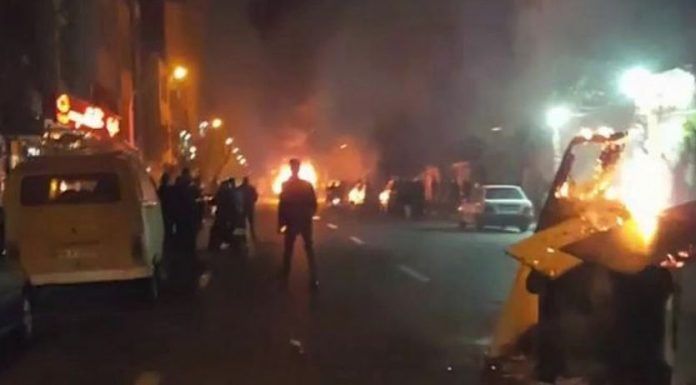The UK’s most worrying bilateral dispute with Iran is the Islamic Republic’s ongoing detention of British dual nationals, according to written evidence produced by the Foreign Office.
The evidence, which was submitted to the Commons Foreign Affairs Committee inquiry into the UK’s stance on Iran’s activities, also outlined concerns around the nature of the arrests.
The Iran Unit for Her Majesty’s Government which submitted the report on behalf of the Foreign Office, said several of the detainees had been held on “unclear and seemingly spurious ‘national security’ charges.”
Iran has faced criticism from the international community for its detention of foreign nationals. Concerns raised include the view that arrests are unfounded, and that detainees are used as political leverage to settle debts and secure the release of Iranians who are imprisoned abroad.
An unprecedented prisoner swap between the U.S. and Iran on December 8, which led to the release of U.S. scholar Xiyue Wang in exchange for Iranian cancer researcher Masoud Soleimani, has offered hope to the families of imprisoned British dual nationals in Iran.
Speaking to Kayhan Life, Richard Ratcliffe, whose wife Nazanin Zaghari-Ratcliffe has served three and a half years of a five-year jail sentence in Evin prison for alleged espionage, said Mr. Wang’s release was a welcome development. Yet Ratcliffe also pointed to the weaknesses in the UK’s position.
[aesop_image img=”https://kayhanlife.com/wp-content/uploads/2019/08/2017-11-25T144408Z_739994190_RC1278095B40_RTRMADP_3_BRITAIN-IRAN-NAZANIN.jpg” panorama=”off” credit=”FILE PHOTO: Richard Ratcliffe talks to demonstrators after following a march in support of Nazanin Zaghari-Ratcliffe, the British-Iranian mother who is in jail in Iran, in London, Britain November 25, 2017. REUTERS/Peter Nicholls” align=”center” lightbox=”off” captionsrc=”custom” captionposition=”left” revealfx=”off” overlay_revealfx=”off”]
“I was really pleased with Xiyue’s release. The U.S., despite its lack of diplomatic relations, as well as Australia before it, seem to be able to get their people home. It throws the UK’s failure to make progress, and its priorities in protecting their citizens, into sharp relief.”
“I was worried that in the policing of the Iran protests, there would be a knee jerk reaction to blame the unrest on foreigners, which we saw in part, and which could include targeting dual nationals, and that Nazanin and the others would be less likely to get out in the near future. But despite the rhetoric from the authorities, Xiyue was released,” he added.
Following Mr.Wang’s release, French President Emmanuel Macron demanded the freeing of two French nationals, Fariba Adelkhah and Roland Marchal, who are being held in prison in Iran. Iranian Foreign Ministry spokesman Abbas Mousavi dismissed the comments, calling them a form of interference in state matters.
The British Foreign Office’s submission to the Foreign Affairs Committee lists other worries in relation to the Islamic Republic’s conduct. It cites Iran’s nuclear capability as a major concern for the UK, and says, “Preventing a nuclear-armed Iran is of the highest priority.”
The UK government has further set out its views on Iran in the latest United Nations Universal Periodic Review, which criticizes the Iranian government’s failure to uphold its internal legal obligations, as well as its “arbitrary detention of citizens and dual nationals arrested on unclear charges, denied due process and subject to mistreatment.”
The review sets out three recommendations: for the Iranian government to show that detainees are not being tortured or subjected to cruel and inhumane treatment; for it to have an impartial justice system which offers defendants access to lawyers of their choosing; and for it to investigate the sexual exploitation of children living in Iran, and ensuring protection for vulnerable minors in the country.
The U.K. has also reacted to the Iran protests in its capacity as an EU member state. It was one of the signatories of a joint statement prepared by the EU High Representative Josep Borrell Fontelles denouncing the Iranian government’s violent crackdown on demonstrators taking part in anti-government protests.
The joint statement said the use of violence against unarmed protestors was ‘unacceptable’ and urged the Iranian authorities to engage in transparent investigations into the use of lethal force during the protests. Responding to the government-sanctioned internet blackout during the protests, Fontelles said the blackout was a “clear violation of the freedom of speech.”
Richard Ratcliffe said he hoped that the international community would continue to engage in a direct way with the Iranian government.
“I think it is helpful when outside authorities speak plainly to Iran,” he said. “The first step to solving any dysfunctional dependency, whether we are talking about hostage diplomacy or unaccountable government, is recognizing publicly that you have a problem. The Iranian regime is still in denial, and struggling with that first step.”
[aesop_image img=”https://kayhanlife.com/wp-content/uploads/2019/10/2019-10-11T114612Z_59239158_RC174050F990_RTRMADP_3_BRITAIN-IRAN-NAZANIN.jpg” panorama=”off” credit=”Richard Ratcliffe, the husband of jailed British-Iranian aid worker Nazanin Zaghari-Ratcliffe, sits with his daughter Gabriella during a news conference in London, Britain October 11, 2019. REUTERS/Peter Nicholls” align=”center” lightbox=”off” captionsrc=”custom” captionposition=”left” revealfx=”off” overlay_revealfx=”off”]


